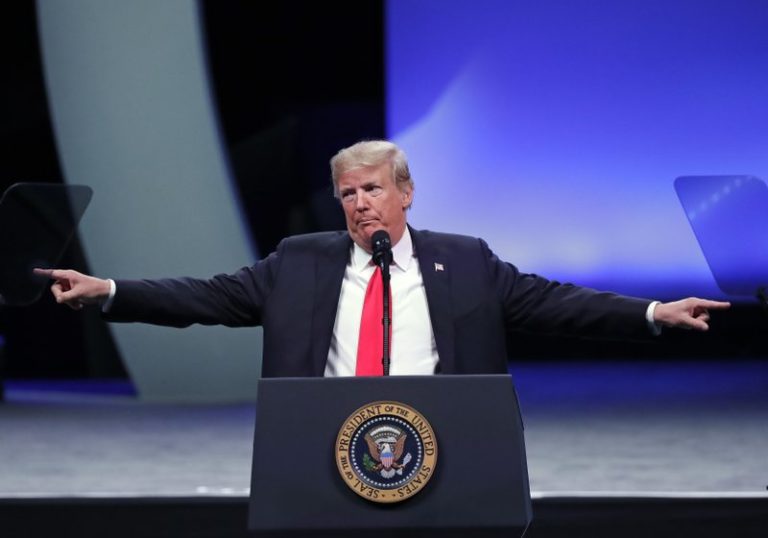President Donald Trump drew an enthusiastic response from a law-and-order crowd Monday, advocating the use of “stop and frisk” policing and saying he has directed the Justice Department to work with local officials in Chicago to stem violence in the nation’s third-largest city.
“The crime spree is a terrible blight on that city,” he said at a convention of the International Association of Chiefs of Police.
Trump said he had ordered Attorney General Jeff Sessions to “immediately” go to Chicago “to help straighten out the terrible shooting wave.” He also encouraged the city to embrace the stop-and-frisk policing method, in which large numbers of people are temporarily detained, questioned and sometimes searched for drugs and weapons. It was used extensively in New York City until it was deemed unconstitutional because of its overwhelming impact on minority residents.
“Gotta be properly applied, but stop-and-frisk works,” said Trump, who had traveled to Orlando with Deputy Attorney General Rod Rosenstein.
Chicago police said last week that there have been 102 fewer homicides and nearly 500 fewer shooting victims in the city this year, compared with the first nine months of 2017. The city of Chicago reached an agreement with the American Civil Liberties Union of Illinois in 2015 to curb stop-and-frisk procedures after the ACLU threatened to file a lawsuit over the issue. The ACLU said the police inordinately targeted blacks.
A spokesman for Mayor Rahm Emanuel blasted Trump for reviving criticism of the city’s homicide rate and the agreement with the ACLU.
“Even someone as clueless as Donald Trump has to know stop-and-frisk is simply not the solution to crime,” Matt McGrath said in an emailed statement.
The ACLU of Illinois’ Karen Sheley said Trump’s comments were neither accurate nor helpful. The Trump administration has consistently “encouraged strong-arm tactics and unconstitutional practices by police,” she said, adding, “The solutions to violence in Chicago are not going to come from Donald Trump.”
The White House and Justice Department didn’t immediately respond to requests for more details on what Trump had asked Sessions to do.
Chicago’s violent crime has repeatedly drawn national attention — and Trump’s — as shootings and homicides climbed to levels not seen in nearly two decades. But the number of homicides has fallen — from 771 in 2016 to 650 in 2017, with a further decline expected this year. The number of slayings still exceeds numbers in Los Angeles and New York combined.
A report last year by former U.S. Magistrate Judge Arlander Keys to assess how Chicago was compiling with the agreement on stop-and-frisk noted a dramatic decrease in the number of stops since the ACLU lawsuit, but found that officers were still targeting racial minorities. The number of investigatory stops fell from more than 1.3 million in 2014 and 2015 to just over 54,000 in the first six months of 2016, the report said.
Emanuel, who recently announced he will not seek a third term, has clashed several times with Trump over the gun violence.
Soon after becoming president, Trump tweeted, “If Chicago doesn’t fix the horrible ‘carnage’ going on … I will send in the Feds!” Emanuel said he welcomed federal help but cautioned against the strictly “tough and rough” approach Trump seemed to advocate.
Trump’s comments came three days after a jury convicted white Chicago police officer Jason Van Dyke of second-degree murder in the death of black teenager Laquan McDonald. Video showing Van Dyke shooting McDonald 16 times as he walked away from police carrying a knife stoked outrage nationwide and put the nation’s third-largest city at the center of the debate about police misconduct and use of force.
Trump, in his remarks Monday, singled out politicians who have criticized police, often in the wake of shootings of young, black men.
“Politicians who spread dangerous anti-police sentiment make life easier for criminals and more dangerous for law-abiding citizens,” he said.
Just weeks before the midterm elections, Trump accused Democrats of being soft on crime.
“The Democrats fight us at every turn. Whether it’s law enforcement or military. They fight us at every turn. And we win,” Trump said.
And he blamed “evil” people for nearly sinking his Supreme Court nominee, Brett Kavanaugh’s confirmation, saying, “It was a disgraceful situation.”
Trump said Kavanaugh would be “a faithful defender of the rule of law.”
Hours before Trump addressed the police chiefs, a handful of protesters outside the Orange County Convention Center waved signs reading “Sexual Predators Belong in Jail Not as President or Supreme Court” and “We Wish You Were Fake News.”
Trump also heralded recent declines in unemployment as a positive step toward lower crime rates. He said he was working hard on the opioid crisis and announced more than $42 million in new grant funding for innovative projects to fight the drug epidemic.
The money will fund more than 50 innovative projects through the White House Office of National Drug Control Policy’s High Intensity Drug Trafficking Areas Program.
(AP)












3 Responses
Rahm Emanuel is a hopeless liberal friend of Obama who believes that being liberal will make the blacks better. We who see reality, note that it does not make blacks better people rather it encourages them to break the law since it is easier to get away with it.
NYC instituted a zero policy for any crime, even the most minor, like sneaking past turnstiles in the subways. This policy had a major effect on curbing crime.
Since he criticized Obama for the Chicago crime problem when he was President, so I guess the degenerate lying adulterer is now responsible, get busy and take care of it!
GOSH, I CAN’T IMAGINE WHY MORE BLACKS ARE STOPPED, CAN YOU